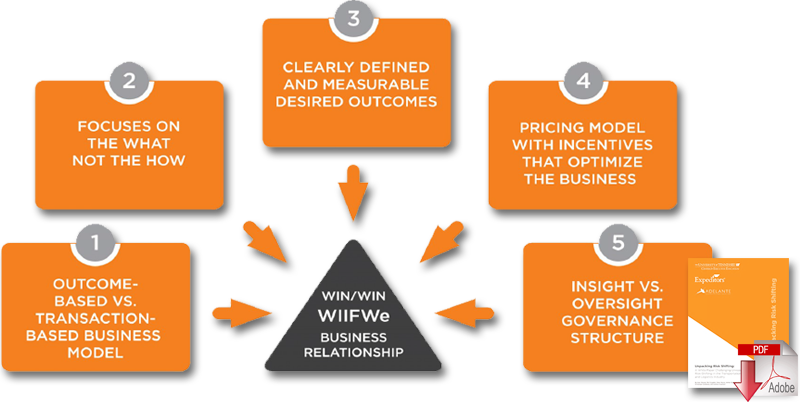Shifting Risk and Meeting in the Middle Might Be Key to Shipper & Third-Party Logistics Relations

The issue of 3PL commoditization has been repeatedly raised, with 3PLs expressing the desire for shippers to view them more as strategic partners and not just as suppliers.
The relationships between shippers and third-party logistics providers (3PLs) on the surface can be as easy or complex as required, depending on what its objectives and parameters are.
When there are issues between a 3PL and shipper, there can be myriad reasons as to what the root problems are where its origins lie.
A recent white paper, entitled “Unpacking Risk Shifting: A White Paper Challenging Unreasonable Risk-Shifting in the Transportation Industry,” written by what could be viewed as a collection of logistics “all-stars,” including academics, 3PLs and shippers, and consultants, examines the “Gresham’s Law” scenario in transportation and logistics.
Gresham’s Law is described in the white paper as “an economic principal that states bad money will drive good money out of circulation, and the authors of the white paper contend that is what is currently happening in transportation and logistics, with Global Shippers and Consignees seeking “extreme commoditization of those services also apply bad contracting practices to them.”
At a high level, the white paper explains while companies are smart about buying 3PL services, 3PL’s centralization of procurement services and automated procurement practices have enabled Global Shippers and Consignees (GSCs) to have success in bundling complex logistics functions and subsequently allow procurement executive to commoditize 3PL services and subsequently reduce the price per transaction.
This is where the problems kick in, according to the white paper, because the authors make the argument that some GSCs have gone too far and want innovation and investment by 3PLs, with 3PLs reluctant to deliver, citing how “razor thin margins and short-term commodity-based contracts create a disincentive for 3PLs to make investments.
What’s more, it is also resulting in contracts with an “onerous shift an extraordinary amount of unreasonable risk to 3PLs by including significantly lopsided and aggressive terms and conditions. We argue that transactional ways to procure 3PL services are at a tipping point and need to change.”
I had an opportunity to speak with one of the white paper’s authors Adrian Gonzalez, president of Adelante SCM and founder/host of Talking Logistics, about its thesis and findings.
Gonzalez explained that in recent years, the issue of 3PL commoditization has been repeatedly raised, with 3PLs expressing the desire for shippers to view them more as strategic partners and not just as suppliers.
“There has always been this drive from the 3PL community to be viewed more strategically than as a commodity,” he said. “3PLs want to position themselves as competitive differentiators, but I think what led us to do this was that over the past few years a lot of 3PLs saw a significant push towards shifting unreasonable risk on to 3PLs.”
That has been and continues to be a theme that has repeatedly come up again and again, too, at industry conferences and anecdotally, too.
Gonzalez said it is one thing for 3PLs to negotiate these types of contracts in which they are clearly the party with the most risk and the most to lose.
Unpacking Risk Shifting
Rule 1: Focus on Outcomes, not Transactions
Rule 2: Focus on the “What,” Not the “How.”
Rule 3: Agree on Clearly Defined and Measurable Outcomes
Rule 4: Pricing Model Incentives that Optimize the Business
Rule 5: Governance Structure Should Provide Insight, Not Merely Oversight
“Based on these terms, if a shipper went after a 3PL, the 3PL would go out of business,” he said. “It leads to big shippers saying ‘if you to do something, you are liable for a certain amount of money to us, which 3PLs will not sign off on and not accept. But when a 3PL turns down business it hurts them, and there are also 3PLs out there accepting it and thinking that will never happen or taking steps to limit their liability should something go wrong.”
Over time, there have been many procurement people that don’t really understand the 3PL business and its dynamics that are continually trying to shift as much risk as possible to 3PLs, and 3PLs are pushing back.
“It is bad for the industry as a whole, because 3PLs are turning away business, with other 3PLs not realizing what they are doing and running the risk of going out of business,” he explained. “It is also bad for the shipper, because if something does happen, they will not be able to find 3PLs that want their business or they may end up in a stale 3PL relationship that can put their own business at risk if a 3PL is not meeting its obligations.”
As for how a common ground between 3PLs and shippers can be reached, the white paper concludes by challenging them to “get smart about how they are buying and selling 3PL services, including:
- what are my desired outcomes?;
- what is the best sourcing business model for my environment?;
- how do I develop a pricing model that will incentivize so that both the GSC and the 3PL are winners?;
- how can I ensure my client/supplier is the best to fit my needs?; and
- what are the various resources I can use for selecting and creating more strategic commercial agreements with my business 3PL (or GSC)?
These questions provide the impetus for shippers to take a step back and think thorough and discuss with their respective teams and existing 3PL partners, according to Gonzalez.
Related: 6 Rules for Collaborative Global Logistics Contracting

Article Topics
Adelante SCM News & Resources
BluJay research focuses on the need to build resilient supply chains Industry Study looks at Inventory Management as a Critical Function within Omni-Channel Logistics Report: Customer experience is driving supply chain innovation 2015 Top 50 Global & Domestic U.S. Third-Party Logistics Providers Unpacking Risk Shifting How Can Supply Chain Management Enable Profitable Growth? Shifting Risk and Meeting in the Middle Might Be Key to Shipper & Third-Party Logistics Relations More Adelante SCMLatest in Supply Chain
TIm Cook Says Apple Plans to Increase Investments in Vietnam Amazon Logistics’ Growth Shakes Up Shipping Industry in 2023 Spotlight Startup: Cart.com is Reimagining Logistics Walmart and Swisslog Expand Partnership with New Texas Facility Nissan Channels Tesla With Its Latest Manufacturing Process Taking Stock of Today’s Robotics Market and What the Future Holds U.S. Manufacturing Gains Momentum After Another Strong Month More Supply ChainAbout the Author















